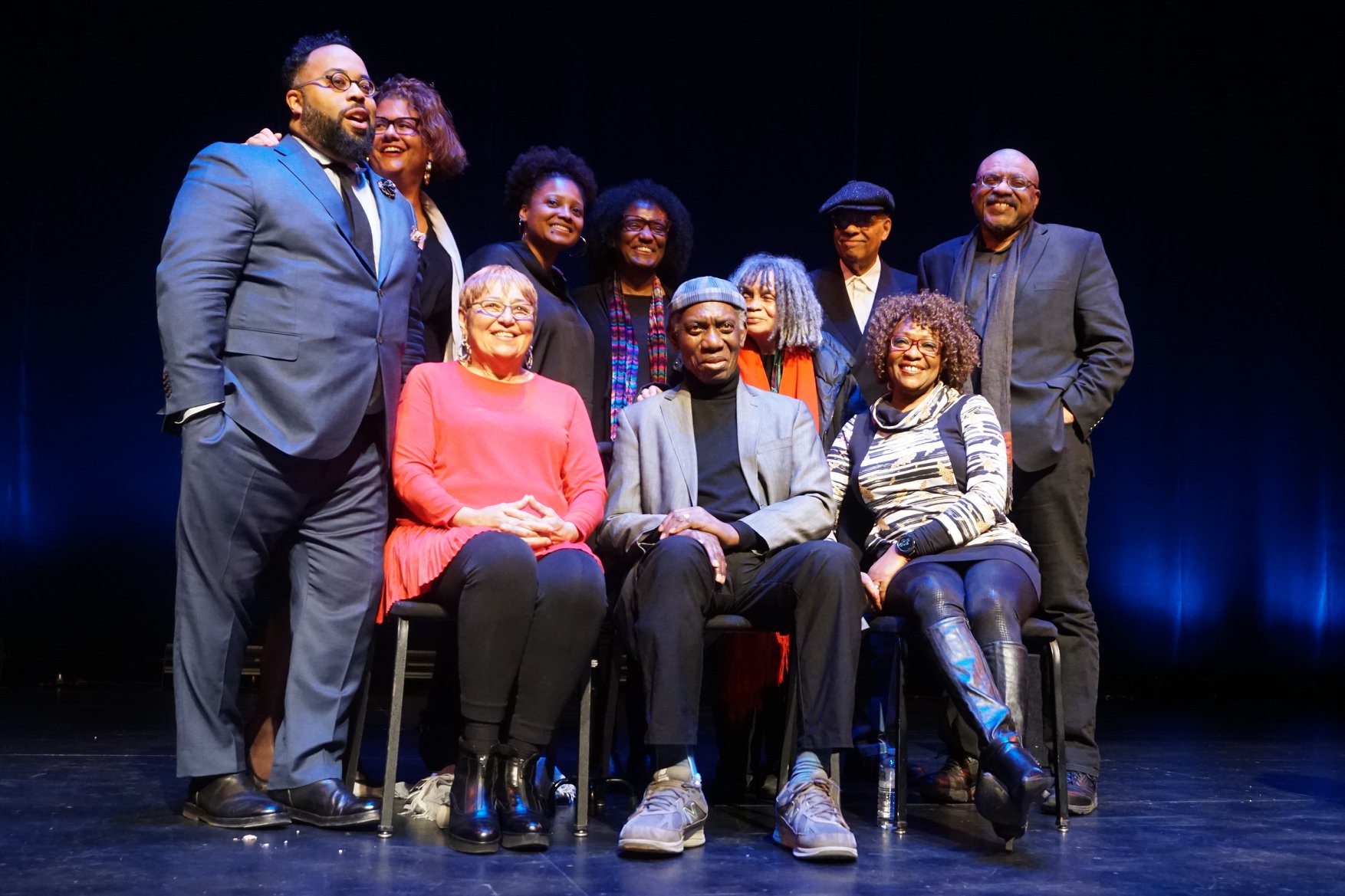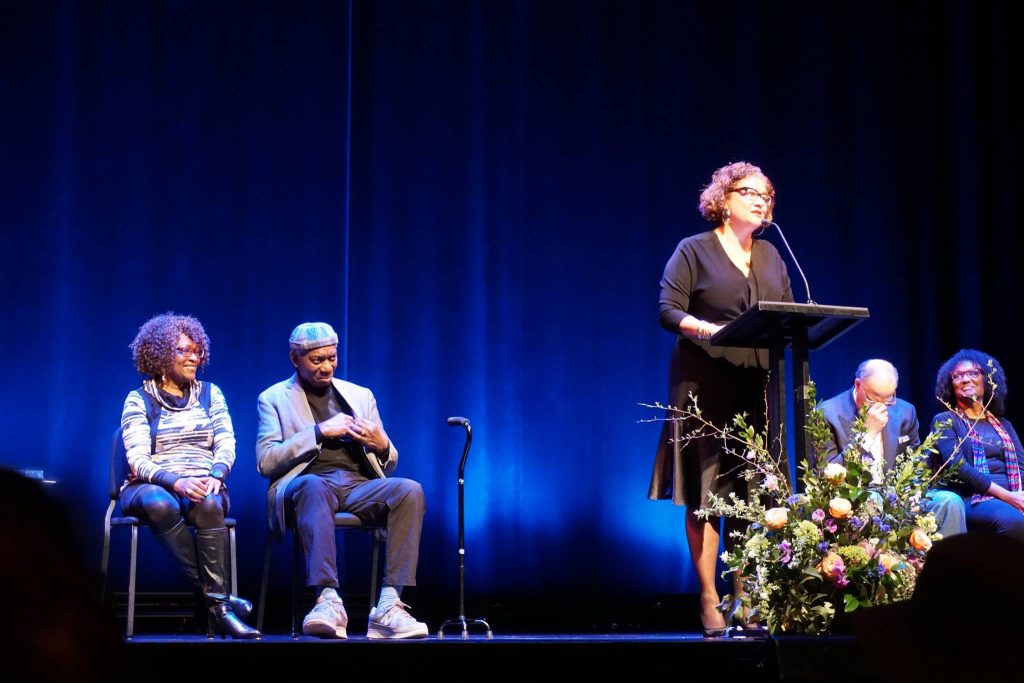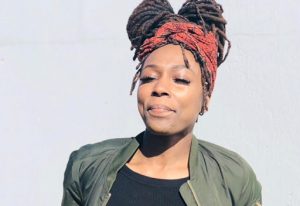This content is being reviewed in light of recent changes to federal guidance.
Black Poetry: Now and in the Future

In the tradition of black poetry and writing conferences, such as the 1966 Black Writers Conference at Fisk, the 2019 Black Poetry: A Conference served as a distinct space through which we honored the history and future of black poetry. Black Poetry was curated by Tracy K. Smith, Joshua Kotin, and Jaamil Olawale Kosoko. Smith, current U.S. Poet Laureate, is the Director of Princeton University’s Creative Writing program. They sought for us to “consider the most urgent social, political and artistic questions of our time.” Four provocations, along with the panels, captured the conference’s commitment to black poets and their creating social, political and artistic discussions through art. Through performance poetry and discussions of poetry and performance, M.NourbeSe Philip, Tyehimba Jess, Jaamil Olawale Kosoko, and Nathaniel Mackey examined memory, death, loss, the blues, and seriality as they relate to black voices.
In connection with the conference, Black Poetry: A Gala Reading took place the night before the first provocation. And it was surely in the spirit of Valentine’s Day – each of us swooning to Rita Dove’s performance of “For My Valentine ,” and to the poems of Kwame Dawes, Harryette Mullen, Kevin Young, Haki Madhubuti, Yusef Komunyakaa, and Sonia Sanchez, as well as the memoirs of Elizabeth Alexander and Toi Derricotte.

Panels
We encountered poetry.
The conference featured over 40 black poets who also performed their work and delivered papers in a series of readings and panels. The poets responded to what poet and scholar Eve L. Ewing described as “assertions thinly disguised as questions.” Many of them opened with poems, as well as singing and dancing, leading us into the possibilities of poetic practice.
Panel 1: History/Ritual, with moderator Roger Reeves and panelists Joanne V. Gabbin, Rachel Eliza Griffiths, Shane McCrae, and Haki Madhubuti, responded to several assertions about the history of black poetry, particularly the ways in which black poets create disturbance:
Black poets create a disturbance, and the disturbances in black poetry serve as a means of confronting the actual (history, politics, social reality) and conjuring the possible (joy, revolution, hope)
Black poets and black poetry (and writing) conferences invoke traditional and nontraditional practices towards examining history and creating space for more of this
Panel 2: Words/Music moderated by Vievee Francis and featuring panelists Cornelius Eady, Douglas Kearney, Jessica Care Moore, Fred Moten, and Sonia Sanchez reflected on the relationships between words and music. We listened to Gil Scott Heron, The Temptations, and we sang back to Douglas Kearney multiple iterations of Jennifer Holiday’s 1982 “And I Am Tellin’ You”. The black poets made these assertions:
Poetry is how to encounter music on paper
Music makes poetry accessible to people who aren’t book worms or who don’t go to book stores
Poetry is sometimes a search for sound, not structure
We create art out of social life, then we throw it back into society as a way toward survival – words and music is how we work shit out
Panel 3: Embodiment/Disembodiment included Deana Lawson, Robin Coste Lewis, Dawn Lundy Martin, and J Mase III, and moderator Saeed Jones explored the poetics of embodied experience – how such a poetics confronts and revises forms of embodiment that have been informed by heteronormativity and white supremacy. The poets examined notions of conscious embodiment and what it means to live in a queer body, asking:
What is a poetics of embodiment for queer black poets?
How have a poetics of embodied experience relocated art’s engagement with the mind or imagination to the body itself?
Panel 4: National/International with Mahogany L. Brown, Myronn Hardy, Rowan Ricardo Phillips, Lemn Sissay, Patricia Smith, Camae Ayewa spoke to the possibilities of blackness, disrupting our notions of country as a physical thing. Eve L. Ewing opened with two poems including Safia Elhillo’s “& what is a country but the drawing of a line”
“today i draw thick black lines around my eyes & they are a country & thick red lines around my lips & they are a country & the knife that chops the onions draws a smooth line through my finger & that is a country & the tightening denim presses a soft purple line into my belly & when i smile like my mother a little black line flashes in between my two front teeth & for every country that i’ve lost i make another & i make another”
asking:
What is a border and what does it matter to diasporic people?
Patricia Smith spoke: I was told the country I was born into would be the only country I would ever have
and we walked away counting the countries in our bodies. Literal and figurative.

Readings
We did poetry.
The readings were a significant contribution to Black Poetry: A Conference, emphasizing the organizers’ international and inter-generational vision, and their honoring of emerging voices. Sharing the stage with influential and celebrated poets such as Natasha Trethewey, Terrance Hayes, and Nikky Finney, affirmed poets like Taylor Johnson and their rightful place in celebrations and discussions of black poetry. Before reading from her debut collection Collective Amnesia (2017), Koleka Putuma (arriving from South Africa) remarked that she was honored to be reading with poets that have been a part of her academic and personal curriculum for years: “I like to think that I called this moment into my life.”
The poets – Jericho Brown, Camille Dungy, Nikky Finney, Taylor Johnson, Jessica Care Moore, Ed Roberson, Natasha Trethewey, Morgan Parker, Simone White, Koleka Putuma, and Terrance Hayes – showed us how to do poetry, the possibilities of doing poetry:
Conclusion
During the final reading, Terrance Hayes began with a draft of an email honoring to Tracy K. Smith. His email – which was undeniably a poem – reminded us of the work of a poet like Tracy K. Smith. We are so thankful for her commitment to creating space for poets to celebrate themselves and the work that they do artistically and professionally. Black Poetry: A Conference recognizes those who do poetry, and those who love the folks that do poetry. I am so honored to have lived this history, to have witnessed this doing of tradition.
 Simone Savannah graduated with her Ph.D. in English-Creative Writing at the University of Kansas in 2017. Simone received her BA in English-Creative Writing and MEd in Cultural Studies from Ohio University. Her research interests include African American Literature & Poetry, Black Feminism/Womanism, and Black Female Sexuality. She is currently working on a chapbook of poems based on the psychology of love and sexuality.
Simone Savannah graduated with her Ph.D. in English-Creative Writing at the University of Kansas in 2017. Simone received her BA in English-Creative Writing and MEd in Cultural Studies from Ohio University. Her research interests include African American Literature & Poetry, Black Feminism/Womanism, and Black Female Sexuality. She is currently working on a chapbook of poems based on the psychology of love and sexuality.